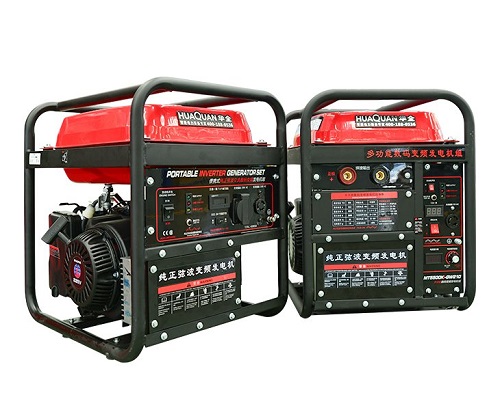
In modern life, reliable home power is crucial for our daily lives. Whether it's lighting, running appliances, or working, electricity is an essential part of our lives. However, natural disasters, emergencies, or technical failures can lead to frequent power outages. Therefore,
home backup generators are increasingly popular among many families as a reliable power source.
1. What is a Home Backup Generator?
A home backup generator is an emergency device that provides temporary power during a power outage, primarily used to meet a home's electricity needs. It automatically starts and quickly switches to power after a power outage, ensuring the smooth operation of home appliances and devices. There are two main types of backup generators: portable and stationary.
1. Portable Generators: These are typically small and easy to move, making them suitable for camping, outdoor activities, or temporary power outages. Although their power output is relatively low, they can easily meet basic power needs.
2. Stationary Generators: These generators are installed outside the home and run on fuel (such as natural gas or diesel). They typically have a high power output and can run multiple appliances simultaneously.
Benefits of Home Backup Generators
Home backup generators not only provide power during power outages but also offer many other advantages:
1. Improved Home Security: During a power outage, security devices like security lights and surveillance cameras require power. The normal operation of these devices enhances home security, allowing for timely monitoring of the surrounding environment and protecting family members.
2. Maintaining Continuity of Daily Life: Power outages often disrupt household activities such as food storage and home theater entertainment. A backup generator can ensure the continued operation of appliances like refrigerators, water heaters, and air conditioners, bringing convenience to families.
3. Supporting Remote Work: For many families working from home, power outages can mean interruptions to their workdays. A backup generator can ensure the normal operation of devices like computers and printers, ensuring that work is not affected.
4. Enhanced Home Value: Installing a backup generator not only improves home security and comfort but also increases property value, especially in areas prone to frequent power outages.
How to Choose the Right Home Backup Generator
When choosing a home backup generator, there are several key factors to consider:
1. Power Requirements: First, determine your home's power requirements and calculate the total power required (in watts). This includes the power requirements of appliances like the refrigerator, air conditioner, and lights. Choose a generator with the appropriate power to ensure it can support the simultaneous operation of multiple appliances.
2. Fuel Type: Home backup generators generally come in a variety of fuel options, including natural gas, diesel, and gasoline. Choose the appropriate fuel type based on your household's needs and the availability of available fuels.
3. Budget: The price of a backup generator varies depending on the brand, power, and fuel type. Develop a reasonable budget, considering both the generator's performance and long-term operating costs.
4. Installation Location: When installing a stationary generator, consider factors such as the location of the house, the location of the power line, and the flue. It's best to consult a professional electrician for evaluation and installation.
5. Brand and After-Sales Service: Choosing a generator from a reputable brand can provide a certain degree of assurance of quality and ongoing maintenance. Be aware of the manufacturer's warranty policy and customer service so you can receive prompt assistance when needed.
IV. Home Standby Generator Use and Maintenance
1. Regular Inspection: Regularly check the generator's oil level, fuel status, and cooling system to ensure proper operation.
2. Cleaning and Maintenance: Keep the generator clean to avoid dust and dirt accumulation. Regularly change the engine oil, air filter, and spark plugs to ensure efficient operation.
3. Test Run: Perform a test run every few months, running the generator for a specified time to check whether it starts smoothly and ensures normal operation in an emergency.
4. Safe Use: When using the generator, pay special attention to fresh water and ventilation to avoid the generation of harmful gases. Ensure that you use an appropriate extension cord and outlet to prevent voltage fluctuations that may damage the device.
V. Common Misconceptions About Home Standby Generators
Although home standby generators are becoming increasingly popular in modern homes, some misconceptions about their function and use remain:
1. Generators are Maintenance-Free: Many people believe that once they purchase a generator, they can continue to use it without any maintenance. In reality, regular maintenance is crucial to ensure that the generator will operate smoothly when needed.
2. The generator only operates automatically during a power outage: Some stationary generators can be set to automatically start when the power goes out, but not all portable generators have this feature, requiring manual operation.
3. The generator's power requirements are crucial: Ignoring power requirements often results in the generator being unable to properly support household appliances. Therefore, before choosing a generator, be sure to clearly understand the power requirements of each appliance and perform appropriate calculations.
VI. Summary
In our homes, a backup generator is more than just a power supply; it is a vital partner in ensuring the comfort and safety of our family. Whether responding to natural disasters, unstable power supplies, or sudden emergencies, it plays a vital role. Therefore, carefully selecting and using a home backup generator will effectively improve your family's quality of life.
Finally, a reminder: Choosing the right home backup generator and ensuring its safe and efficient operation is not only a way to ensure your home's power security, but also a way to cherish and protect your family's daily lives. In this era of interconnected power, make a backup generator an indispensable part of your home.
